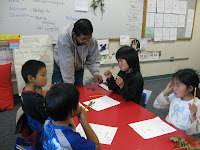By Maria Offer

You may be asking to yourself, “What does SIOP have to do with science?” or even “What is SIOP?” SIOP stands for Sheltered Instruction Observation Protocol and it is an instructional model that is being implemented by LKSD in all schools this year to help improve students’ academic achievement. SIOP provides teachers with a well-researched model of best practices for high quality language instruction, especially to bilingual students.
SIOP has been developed to teach all subjects along with the language, whether it is the Native language, such as Yup’ik or English, that is needed to be successful in that subject, such as math or science. As part of the SIOP plan, teachers integrate language goals, such as reading, writing, speaking and listening, into every class, along with content goals, such as science, math, language arts, social studies or health.
Elementary teachers in Chefornak are developing science notebooks to increa
 se writing in science as well as giving students the opportunity to explore the natural environment. Science notebooks give students the opportunity to learn science and develop their skills in writing. Research shows that use of science notebooks greatly increases academic achievement in science, and in addition, test scores in other subject areas increased by 26%.
se writing in science as well as giving students the opportunity to explore the natural environment. Science notebooks give students the opportunity to learn science and develop their skills in writing. Research shows that use of science notebooks greatly increases academic achievement in science, and in addition, test scores in other subject areas increased by 26%.Chefornak teachers follow the SIOP model by first giving the students direct instruction
 , and then modeling what they want the students to do. With science notebooks, students also have the hands-on experience exploring their environment and collecting data in the field. Kindergarteners and first graders gathered plants on the tundra just behind the school and brought them inside to make their observations and write descriptions in their “Science Notebooks.”
, and then modeling what they want the students to do. With science notebooks, students also have the hands-on experience exploring their environment and collecting data in the field. Kindergarteners and first graders gathered plants on the tundra just behind the school and brought them inside to make their observations and write descriptions in their “Science Notebooks.”They will collect their pages of observations and then add a table of contents and a cover. Next to the word scientist, they write their names.
Teachers demonstrate how scientists use science notebooks when they work in the field or do research in labs. She tells the children that when they are collecting data and writing about it in their science notebooks, they are doing real work as scientists.
And being a real scientist is exciting stuff for kindergarteners and first graders!
When students come back into the classroom after collecting data in the field, they w
 rite their observations, not in English as many scientists in Alaska do, but in Yup’ik. Along with the support of the Yup’ik curriculum staff, teachers are developing science notebooks with writing prompts in Yup’ik. The teachers note that students are learning how to write complete sentences. Teachers model writing scientific observations in complete sentences and also help students by providing “sentence frames” that help them get started.
rite their observations, not in English as many scientists in Alaska do, but in Yup’ik. Along with the support of the Yup’ik curriculum staff, teachers are developing science notebooks with writing prompts in Yup’ik. The teachers note that students are learning how to write complete sentences. Teachers model writing scientific observations in complete sentences and also help students by providing “sentence frames” that help them get started.Julia Lewis, a first-grade teacher says, “Students are doing a lot more writing because I am incorporating writing in science.” That’s important considering writing is an essential skill that students will need as they progress through the grade levels and into the world of work, higher education, and being active members of the community.

Not only are these young children strengthening their literacy skills in their first language, which is Yup’ik, but they are also learning skills that help them gain job skills. Who knows, someday these young students may be future scientists working out in the field, combining their local knowledge of the environment, Yup’ik epistemology, and their skills as bilingual speakers and writers.

An interesting and exciting application of the SIOP. Sounds like the teachers using SIOP there are engaging their students in meaningful projects that encourage them to write and integrate their language and environmental knowledge. I hope that more districts in Alaska will incorporate projects like this.
ReplyDeleteHi Marc,
ReplyDeleteIts good to hear from you. Yes, science notebooks fit right in with SIOP for scaffolding success in increasing students writing skills. And it is culturally-relevant and place-based! I am doing some collaborating with Jennifer Thompson in Juneau, and we are talking about developing science notebooks for the Tlingit program in Juneau! Its exciting!